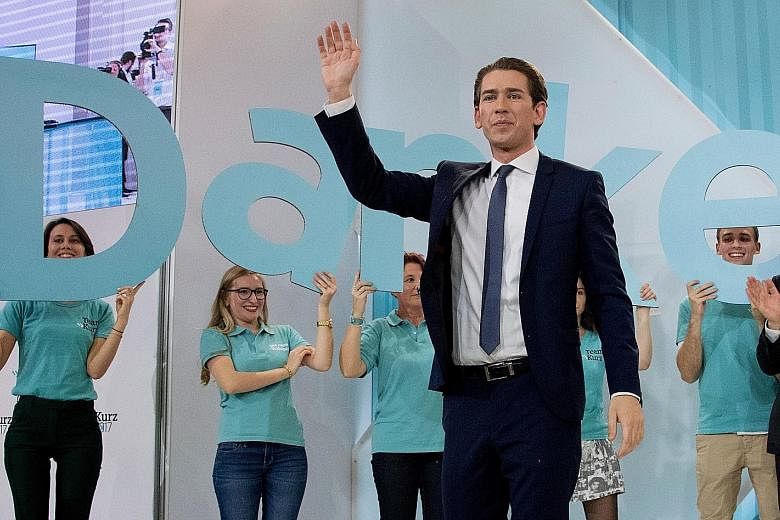VIENNA • Europe's political balance is tilting to the right after Austrian voters paved the way for the nationalist Freedom Party to enter government, suggesting the country will be a more difficult ally for key partners such as Germany.
After a campaign focused on immigration, the People's Party of Foreign Minister Sebastian Kurz, 31, is set to form a new coalition, with the Freedom Party as likely junior partner.
Mr Kurz, who sought to outflank the nationalists with a hardline stance on refugees, was the biggest winner in Sunday's election and is poised to become the world's youngest head of government.
"We made the impossible possible," the telegenic Mr Kurz told supporters who had gathered at the 19th-century Kursalon music hall in Vienna to watch the results after five months of intense campaigning marred by fake Facebook sites that tried to tarnish his image.
"I promise you that I will fight with everything that I have for change in this land," he said. "We have to establish a new political style in this country, we have to create a new culture."
While the Freedom Party has been part of Austrian governments before, the election shows how Europe's nationalist agenda is still gaining ground after Germans three weeks ago elected a far-right party to Parliament for the first time since immediately after World War II.
"I'm feeling somewhat vindicated by the fact that way more than 55 per cent have voted for the Freedom Party's platform, because big parts of our programme were copied by other parties," said party head Heinz-Christian Strache, 48, on a television panel.
Chancellor Christian Kern, whose Social Democrats could theoretically renew their coalition with the People's Party, said he expects Mr Kurz and Mr Strache to agree on a coalition pact soon.
Final results could be out as early as today, after the counting of a large number of postal votes.
During the campaign's final weeks, two fake Facebook pages linked to Mr Kern's party rocked the normally sedate world of Austrian politics. One cast itself as a fan-boy site for Mr Kurz, but included dodgy accusations that non-governmental organisations were smuggling in thousands of migrants.
The other appeared to be a far-right attack site against Mr Kurz, and was laced with anti-Semitic conspiracy theories.
In the end, neither site was what it appeared. But both, according to the Austrian media, had the same unlikely creator: a former consultant for the re-election campaign of Mr Kern.
With the Freedom Party poised to return to government for the first time since 2005, congratulations poured in from European nationalists, including France's Marine Le Pen and the Netherlands' Geert Wilders, while the World Jewish Congress expressed concern. For German Chancellor Angela Merkel, the result may chip away at a key ally's pro-European stance in the years ahead.
Sunday's result also marked a voter revolt against Austria's tradition of government by the two biggest parties, which have run the country together for 44 of the 72 years since World War II, including the past decade.
While Mr Kurz and Mr Strache might shake up that cosy political order, they broadly agree in pledging business-friendly policies, notably to scrap corporate taxes on retained profits. They will also stay in the German-led camp favouring fiscal austerity in the euro area.
"There won't be a debate to leave the European Union, but the Freedom Party is strong enough to demand significant concessions" and may lead Austria to align more often with Eastern European countries that have challenged Dr Merkel on issues like migration, said political consultant Thomas Hofer in Vienna.
"Austria has mostly been an ally of Germany for decades, but that picture could change more often now."
BLOOMBERG, WASHINGTON POST

